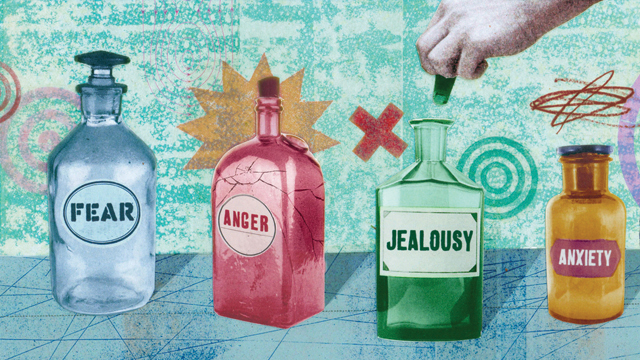Perhaps it was meant as a helpful suggestion. Maybe it was intended as a straight-up accusation or invitation to argue. Either way, if it sends you into emotional hyperspace, it will probably result in an ugly aftermath — a blowout with your spouse or a nasty encounter with a coworker. The resulting surge of stress hormones can leave everyone feeling shell-shocked. And harsh words spoken in haste can do lasting damage to your relationships.
So how do you prevent spontaneous, seemingly uncontrollable overreactions from getting the better of you?
According to Judith Siegel, PhD, LCSW, author of Stop Overreacting: Effective Strategies for Calming Your Emotions, heeding “early warning signals” from our bodies can give us a chance to dampen emotional fires before they burn out of control.
Barriers to Overcome
- The triggering emotions. There are four main triggers for overreaction, says Siegel: envy, rejection, resentment at being criticized and loss of control. Even the most seemingly benign interaction may spark one of these responses, triggering our fight-or-flight response and limiting our ability to react in a rational or constructive way.
- Black-or-white perception. As an emotional overreaction builds, you’re likely to see situations or people as either all good or all bad. “At those moments,” says Siegel, “it’s as if we had a two-drawer filing cabinet in our heads. When the ‘bad’ drawer is open, the ‘good’ one has to be closed. We can’t see any redeeming features in the situation or the other person.”
- Flooding. “In addition to dealing with the challenging moment at hand, you may find that every old and negative emotional memory associated with the situation floods over you,” Siegel explains. That can make the current situation seem bigger and more connected to higher stakes than it really is.
- Feeling entitled. The black-or-white response, intensified by “flooding,” can result in your feeling justified in having an outburst or other extreme reaction.
How to Cope
- Notice the body’s signals. “Your neck may get tense, your heart may start to pound,” says Siegel. “Anxiety, which is a bodily response, may encourage your thoughts to start racing. These are warning signals.” If you’re in tune with your body and recognize these signs, you’ll be better able to shift emotional gears and avoid overreacting.
- Breathe. Conscious breathing will help you interrupt the fight-or-flight response and give you a chance to shift out of overreaction mode. Practice deep breathing whenever you feel your body’s warning signals switch on.
- Assess your state. Feeling tired? Emotionally ragged? Experiencing low blood sugar? If so, Siegel suggests, it may be wise to withdraw from the situation and revisit the issue when you’re feeling more centered and self-composed.
- Name the emotions. Neurologically, overreaction is a loss of access to the left brain. “Naming the feeling that you’re having in the moment — anger, loss of self-esteem — requires reflection and searching the memory, and that’s a left-brain activity,” says Siegel. “It reestablishes the neural networks that connect left brain and right, and restores balance.”
- Recast criticism. “Strive to reframe less-than-positive input as useful information,” advises Siegel. In the face of criticism, ask yourself: What can I learn from this feedback? How can I use this information to improve myself or my situation? By asking constructive questions, you can turn what might have been battleground moments into learning opportunities.
This article originally appeared as “Who’s Overreacting!!!” in the January/February 2011 issue of Experience Life.





This Post Has 0 Comments